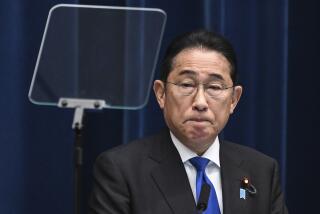3 Vie to Head Japan’s New Opposition Party : Asia: Infighting may undercut New Frontier’s chances to give the country a strong two-party system.
- Share via
TOKYO — Fissures within a new opposition party that might give Japan a two-party system rose to the surface Wednesday when talks to choose a leader by consensus collapsed.
Instead, three candidates--former Prime Ministers Toshiki Kaifu and Tsutomu Hata, and Takashi Yonezawa, chairman of the middle-of-the-road Democratic Socialist Party--filed to run for leadership of the New Frontier Party in a vote that will be held today.
The eight parties joining to form the new party have about 180 representatives in the lower house--roughly 20 fewer than the Liberal Democrats who now govern in coalition with the smaller Socialist Party. That would make the New Frontier legislators the largest opposition force in Japan’s modern political history. But the divisions in their ranks point to a troubled future, regardless of who wins the leadership contest.
All three of the candidates waited until just before the Wednesday deadline to file.
Ichiro Ozawa, who in June, 1993, led a mass defection from the Liberal Democrats that broke the party’s 38-year lock on the national government, was named Frontier’s new secretary general when no rivals filed by the deadline. As campaign director and chief fund-raiser, he is expected to act as Frontier’s chief strategist.
More than anything else, the splintering of the opposition helped to sustain the Liberal Democrats’ seemingly unbreakable grasp on power until the Ozawa-led rebellion. Between 1955 and 1993, no opposition party ever held more than 167 seats in the 511-member lower house. The Socialists, who head the current coalition government, won that many in a 1958 election.
Minoru Morita, a respected political commentator, predicted that Frontier’s infighting and its failure to offer clear policy alternatives would allow the Liberal Democrats to regain sole control of government in the next general election. He predicted that vote would probably be held simultaneously with a regular upper house election in July.
The Socialists, who abandoned all their traditional policies to ally themselves with the Liberal Democrats in what the Frontier Party has called an “illicit union,” will lose seats by the dozens, opening the door to a Liberal Democratic victory, Morita predicted.
However, Morita said, both the Liberal Democratic and the New Frontier parties reflect within their ranks the deep divisions of Japanese politics: whether Japan should be an open or a closed society and have a small or a large government. Consequently, neither party can enunciate clear policy, he said.
Public apathy toward politics, as a result, has soared; 55% of the voters say they support no political party, the commentator added.
Hata said he decided to force a vote on the Frontier leadership despite a week of talks aimed at naming Kaifu by consensus because “an election is democracy’s social contract to the people.”
Ozawa, Hata’s onetime political ally and usually an advocate of decision-making by majority vote rather than by back-room deals, disagreed this time. Since he and Hata belong to the Renewal Party, Ozawa favored Kaifu, a recent defector from the Liberal Democrats, as leader to provide a balance.
In addition to the Hata-Ozawa falling out, both the Buddhist-backed Komei (Clean Government) Party, the second-largest group in the new party, and Yonezawa’s Democratic Socialists announced measures to keep their separate identities within the new party--as if to preserve a fallback position should the Frontier Party break up.
Moreover, two lower house members of the Democratic Socialist Party, including its former chairman, Keigo Ouchi, said they will not join Frontier when it stages its inaugural convention Saturday.
Ouchi, who led the party into the first anti-LDP coalition in August, 1993, complained that Frontier lacks a unified political philosophy. He charged that “the new party is destined to become a party of the Soka Gakkai,” a Buddhist laymen’s group that founded and controls the Komei Party.
There is widespread public aversion to the Soka Gakkai’s exercise of political power.
More to Read
Sign up for Essential California
The most important California stories and recommendations in your inbox every morning.
You may occasionally receive promotional content from the Los Angeles Times.













